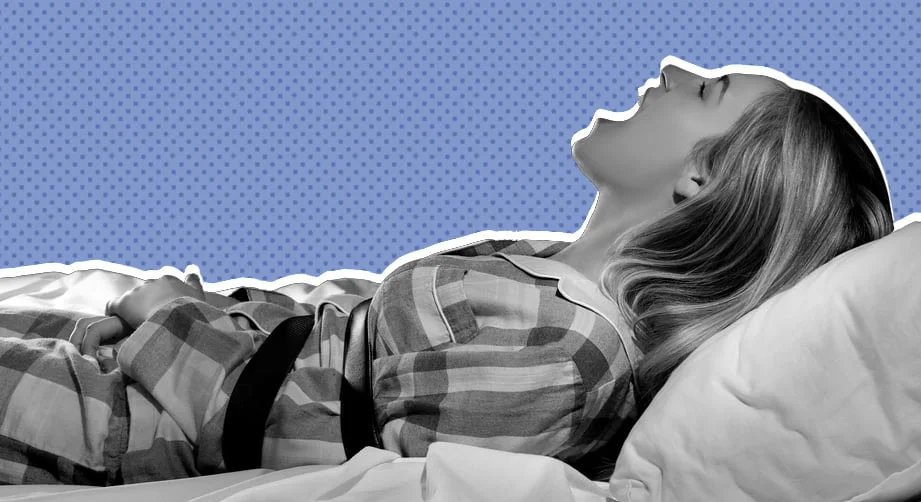
Maisie Williams, best known for her role as Arya Stark in Game of Thrones, shared recently that she experienced nightmares and sleep paralysis during the production of soon to launch TV series, The New Look. (1) She underwent an intense routine to portray Catherine Dior, a resistance fighter during World War II.
Sleep paralysis sounds as scary as it is — a brief moment when you’re unable to move or speak, which typically happens just as you’re falling asleep or waking up. “Typically, a person with sleep paralysis will experience a partial paralysis of their body and may have hallucinations, even though their brain is awake,” explains Dr. Chelsie Rohrscheib, a neuroscientist and head of sleep science at clinical sleep testing company, Wesper.
Sleep paralysis is common in people who are chronically sleep-deprived, take certain drugs or medications, are stressed, or have certain sleep disorders or neurological conditions, which may be why Williams experienced its effects, according to Dr. Rohrscheib.
How Sleep Paralysis Feels
“Sleep paralysis occurs because our body is partially paralyzed during REM sleep when we dream, so we do not act out our dreams and injure ourselves,” explains Dr. Rohrscheib. People experiencing sleep paralysis find themselves awakening during the REM phase of sleep. Their bodies, however, remain in a state of paralysis, making movement challenging for a few seconds to a minute. This can be accompanied by unsettling visual and auditory hallucinations that can, understandably, be quite disturbing.
According to Lauri Leadley, Clinical Sleep Educator at Valley Sleep Center, an independent sleep diagnostics center in Arizona, an estimated 75 percent of sleep paralysis episodes involve hallucinations that differ from a typical dream. These can include perceiving a dangerous person or presence in the room (intruder hallucinations) and the feeling of suffocation that frequently accompanies intruder hallucinations. Vestibular-motor hallucinations, which are feelings of movement (such as flying) or out-of-body sensations, are also common.
Stress and Other Factors Can Be a Trigger
Busy, overtaxing lifestyles like the kind Williams had while working on The New Look can be a trigger for sleep paralysis, according to Dr. Rohrscheib. “Stress increases REM sleep because it plays a role in emotional processing. A highly stressed individual or someone with a mental health disorder spends more time in REM, increasing their risk of waking up during a REM cycle,” she says.
What’s more, highly stressed individuals are more prone to insomnia and poor sleep quality, which deprives them of sleep, and as a result, are more likely to suffer sleep paralysis. And in a cruel twist of fate, highly stressed and anxious individuals are more likely to take medications such as sleeping pills that can also activate sleep paralysis, according to Dr. Rohrscheib.
Sleep paralysis can occur at any age, but the first symptoms generally appear before young adulthood, according to Leadley. “One out of four individuals will experience an episode of sleep paralysis at one point or another in their lives, and while some people might experience sleep paralysis only once, others might experience periodic or frequent episodes,” she says.
Other factors that can lead to sleep paralysis are the same conditions that cause poor sleep, namely narcolepsy, idiopathic hypersomnia (extreme, unexplained tiredness), dementias, traumatic brain injuries, obstructive sleep apnea, and insomnia disorder. “Typically, sleep paralysis is a symptom of these disorders and not the other way around,” says Dr. Rohrscheib.
Long-Term Effects and Risks
Fortunately, sleep paralysis, while distressing, is generally not life-threatening, but there are real risks involved. “The main risks include poor sleep quality, increased risk for poor mental health, and increased risk for poor coping skills, such as drug use,” says Dr. Rohrscheib. People with chronic sleep paralysis are also at an increased risk for suicide.
What’s more, if other health conditions or sleep disorders cause sleep paralysis or lead to trouble sleeping out of anxiety or fear, the individual will be at risk for any associated long-term health issues.
Treatments and Strategies to Prevent Sleep Paralysis
Leadley recommends seeing a behavioral therapist who specializes in sleep medicine to help anyone experiencing sleep paralysis learn to cope. “It can also help them learn techniques to break out of a sleep paralysis episode when they occur,” she adds. Seeing a sleep specialist to rule out other sleep disorders, such as narcolepsy, sleep apnea, and insomnia, that may be the primary cause of sleep paralysis is a good idea.
Avoid drugs, alcohol, and medications, as sedative substances like these can make sleep paralysis worse. However, certain medications, such as medications used to treat depression and anxiety (SSRIs), may reduce sleep paralysis by inhibiting REM sleep, according to Rohrscheib.
“A disrupted sleep schedule or someone suffering from shift work sleep disorder can be at risk of experiencing sleep paralysis,” says Leadley. Practicing good sleep hygiene and maintaining a regular sleep schedule will increase the likelihood of getting consistent sleep,reducings the chance of sleep deprivation and paralysis episodes.
And it’s beneficial for your overall wellbeing and sleep health to take some time to recover from a busy schedule. Practice de-stressing activities and self-care practices that let your brain and body rest, such as yoga nidra, meditation, and spending time with friends.
If you’re experiencing sleep paralysis or are concerned about your sleep health, contact your healthcare provider for advice.
Sources
1. The Citizen; https://auburnpub.com/partners/video-elephant/life-entertainment/celebrity/maisie-williams-suffered-sleep-paralysis-while-working-on-the-new-look/video_054f755d-882a-567f-8f54-6866c8efc7f7.html; February 2024.
Rohrscheib, Chelsie. Author interview. February 2024.
Leadley, Lauri. Author interview. February 2024.


























